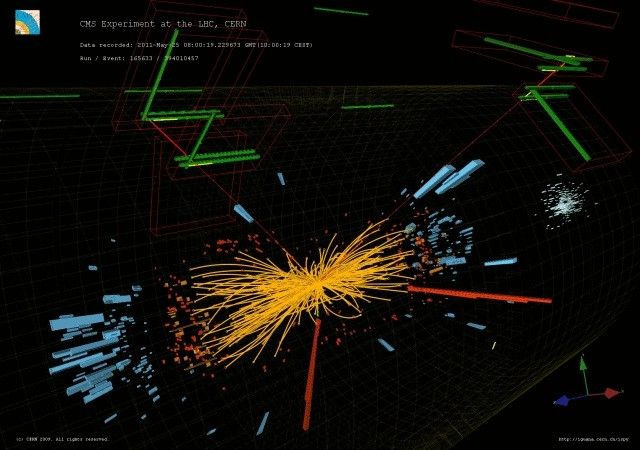God Particle Creates Nobel Prize Row

Even before the excitement over the discovery of the Boson-like particle could die down, scientists seem to be clamoring for their pound of flesh in staking their claim for the particle discovery, and thereby the Nobel Prize.
The fracas came to the fore as scientists from ATLAS and CMS, who independently conducted experiments at two of the giant atom-smasher's four detectors, claimed to have identified the particle that has life for only a tiny fraction of a second before it decays into other particles and can't be tracked down as it cannot be seen.
At both ATLAS and CMS, thousands of scientists are said to be involved in tracing the particle from the subatomic debris generated from over a trillion collisions inside the Large Hadron Collider (LHC). And all seem to deserve credit for the effort.
As a recap, after nearly 50 years of research, physicists at the European Organization for Nuclear Research (CERN) announced Wednesday they discovered a new sub-atomic particle consistent with the elusive Higgs Boson that is believed to confer mass.
For handing down the award, the Nobel Prize Committee seems to recognize theoretical physicists who commenced work over 50 years ago. Based on a report published in the Sydney Morning Herald, six physicists published the theory within a four-month time span in 1964 -- Robert Brout and Francois Englert at the Free University of Brussels first published their theory in August. Peter Higgs followed this with two papers in the September and October. Finally, a group of three physicists comprising U.S. researchers Dick Hagen and Gerry Guralink and British physicist Tom Kibble published their work in November. With Brout dead, five of the living physicists are top contenders for the Nobel Prize.
As ever, the Nobel Prize Committee has a tough job in hand as science Nobel prizes are given to a maximum of three people with their contributions being judged the most important.
If the particle discovered is confirmed to be the Higgs Boson, then definitely Peter Higgs will be honored. Among the other four physicists, Francois Englert who first published the theory stands at a vantage point. And with the two prizes gone, there are three contenders for the third prize.
Earlier in 2010, U.S. physicists complained that organizers of a conference in Paris on the Higgs Boson credited only Higgs, Englert and Brout for the theory.
It remains to be seen if the Nobel Prize Committee would want to confer all three awards on scientists involved in the Boson experiment and if it does honor all three from the same experiment, it remains to be seen who will be the chosen ones.
This apart, the Nobel Committee faces a familiar issue of giving away awards to a small number of scientists when in reality modern science has spawned a large population of worthy scientists and multiple discoveries. Further, discoveries in the present period are not confined to small groups or individuals as teams are engaged in such efforts. Given this scenario, should the Nobel Prize Committee revisit its appraisal norms of winners when limiting the number of winners accords prestige to the prize issuing committee?
© Copyright IBTimes 2024. All rights reserved.





















